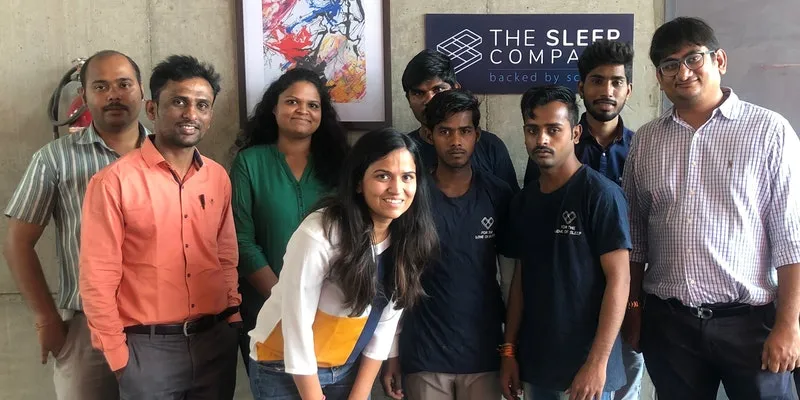How lack of sleep made these new parents build a mattress startup
Mumbai-based The Sleep Company has built smart grid mattresses with no memory foam, no spring, no coir, or latex. It has a patent-pending technology, which provides comfort and pain relief.
Like most new parents, one of the things that troubled Priyanka Salot and Harshil Salot when they welcomed their newborn was a good night’s sleep. It turns out that parents’ sleep falls from an average of six hours per night to just four hours after their baby is born.
To get the most out of those few hours, Priyanka and Harish felt it might be time for a mattress upgrade. But to their dismay, they just couldn’t find the right one. This led to them to set up The Sleep Company in Mumbai in 2017.
The startup’s smart grid mattress has no memory foam, no spring, no coir, or latex. It has a patent pending technology to provide ultimate comfort and pain relief.
“We realised there was a huge gap between quality/comfort of products you see in India and other developed markets. Sleep products are so ignored here. So, we got in touch with research organisations and then looped in experts and scientists from Defence Research Development Organisation (DRDO) to work on this technology. After two years of research Sleep Technology, smart grid mattress was born,” says Priyanka.
The biggest challenge the startup faced was to develop a completely new technology and product from scratch. The team pooled in their personal savings of Rs 1.5 crore and set up a manufacturing unit to develop smart grid mattresses.

The Sleep Company Team
Building the team
Both Priyanka and Harshil are IIM Calcutta graduates. Priyanka has a marketing background, and has worked with P&G in marketing, and was the head of multiple brands for P&G India business like Pampers, Ariel, and Tide. Harish, on the other hand, comes with a finance and manufacturing background, and has worked in the US, Europe, Japan, and Canada.
The husband-wife duo roped in Dr V Tripathi, the brain behind smart grid technology, with the help of references and contacts. He currently heads the R&D division at The Sleep Company. He is a rocket scientist who has worked with DRDO for over 40 years, and then consulted multiple companies to develop disruptive and winning products.
They also roped in Abhishek Singh who has been working in the mattress industry for 15 years. They have a team of 20 people at present.
The product
The smart grid has a column structure, which intelligently takes the shape of the body. The walls are designed keeping average Indian body weight - they buckle on smaller body parts like hips and shoulders to provide cushioning and comfort. However, the walls stay firm on a bigger body part like the back to keep the spine in natural shape to ease the pain.
“After the initial prototype was ready, the biggest task was to set-up a manufacturing unit for the product. As this was a completely new technology, none of the existing practices of machinery used in the industry could be used. Hence, we had a team which spent a year to setup and customise all the machinery to produce smart grid mattress,” explains Priyanka.
Currently being sold online, The Sleep Company mattresses are available on ecommerce platforms like Amazon and Flipkart.
Pricing and market
They startup offers two mattress models - The Sleep Company 1.0 priced between Rs 15,000 and Rs 35,000, and The Sleep Company 2.0 priced between Rs 25,000 and Rs 45,000.
While the team refused to share the number of orders they have sold so far, it has seen a 500 percent growth in the past three months since it hit the markets.
Currently, The Sleep Company competes with Sequoia-backed Wakefit. India’s mattress market is estimated to be worth Rs 10,000 crore. Startups like Cuddl, SleepyCat, Wink&Nod, and Sunday Mattress are all taking sleep seriously using advanced tech and raw materials to build their products. Horizontal marketplaces like Amazon, Flipkart, Snapdeal, and ShopClues also offer branded and unbranded mattresses.
Speaking of their future plans, Priyanka says, “We want to become the one-stop solution for all sleeping needs. We would be looking at expanding our manufacturing and bringing in more products in the smart grid technology that can continue to help upgrade the quality of sleep.”
(Edited by Megha Reddy)









